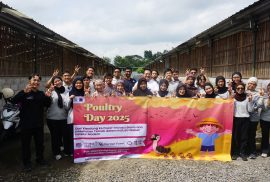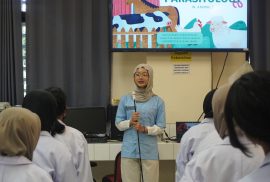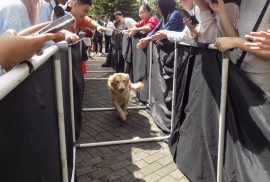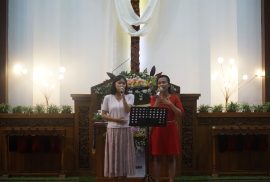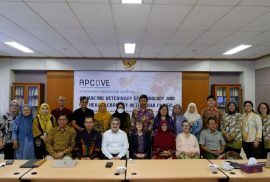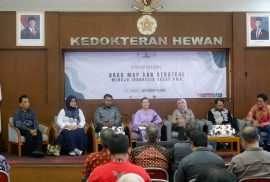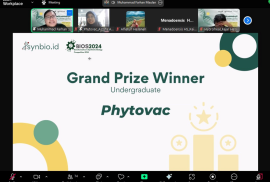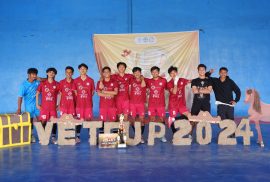Poultry Day of the Productive Livestock Study Association (Himpunan Studi Ternak Produktif) 2025 is a work program organized by the Poultry Division of HSTP FKH UGM.
SDG 3: Good Health and Well-being
On Sunday, May 4, 2025, the Productive Animal Husbandry Study Association (HSTP) of the Faculty of Veterinary Medicine, Universitas Gadjah Mada, successfully held the “HSTP Bergerak” event with the theme “Vet Camp: A Day in the Life of a Veterinarian, Veterinarian in Action.” This event was attended by 84 participants from various high schools in Yogyakarta and surrounding areas.
“Easter Special” Dog Run is a collaborative activity between the Pet Study Group (KSHK) of the Faculty of Veterinary Medicine, Universitas Gadjah Mada and the Dog Run Community located in Yogyakarta.
The Easter Worship and Celebration is an annual event held at Universitas Gadjah Mada. In 2025, the Christian Student Fellowship (PMK) of the Faculty of Veterinary Medicine (FVM) UGM also organized its own Easter Worship and Celebration. This event took place on April 26, 2025 from 04.00 to 07.40 PM at GKJ Samirono Baru.
The Faculty of Veterinary Medicine (FKH), Universitas Gadjah Mada (UGM), is collaborating with the University of Sydney, Australia, as the lead institution in the Strengthening Veterinary Workforce in Asia-Pacific for Diseases Detection and Response (Vet-APIDDaR) project, funded by the Australian Department of Foreign Affairs and Trade (DFAT).
The first material was delivered by the Director General of Animal Husbandry and Animal Health (PKH) of the Indonesian Ministry of Agriculture, Dr. Agung Suganda, DVM., M.Sc. regarding the Road Map for Eradication and the Current Situation of FMD in Indonesia. The Strategic Framework for a FMD-Free Indonesia 2035 is outlined in 8 pillars, including FMD vaccination, continuous observation of FMD (surveillance), strict biosecurity and restrictions on the movement of animals susceptible to FMD, preparedness and emergency response to FMD, restoration of productivity of ruminant livestock after being affected by FMD, handling the socio-economic impact of FMD, especially for people’s livestock, and coordinating with stakeholders from within and outside the country. The Ministry of Agriculture encourages the implementation of Independent Vaccination and ensures the availability and access to good quality of FMD vaccines.
Then the second speaker, Prof. Dr. AETH Wahyuni, DVM., M.Sc., a Professor from the Department of Microbiology FVM-UGM, said that Foot and Mouth Disease (FMD) is an infectious disease that attacks cloven hoofed animals, both livestock such as cows, goats, buffalo, sheep and pigs as well as wild animals such as deer, bison, giraffes and even elephants. FMD is caused by the Foot-and-Mouth Disease Virus (FMDV) and is not a zoonotic type because this disease is not transmitted to humans. FMD itself is a serious Transboundary Disease because it is very contagious, can spread nationally and internationally quickly and unexpectedly.
The third speaker, Dr. M. Munawaroh, DVM., MM., General Chair of the Indonesian Veterinary Medical Association (IVMA), explained that handling the FMD outbreak requires a comprehensive and collaborative approach by all parties. Some of the recommendations given are the restoration of affected farms, improving the skills of veterinarians and veterinary medical officers in the field. Invest in vaccine and treatment research, carry out regular vaccinations for a minimum of 5 years.
The role of Veterinary Colleges in Handling FMD was conveyed by the fourth speaker, Prof. Agung Budiyanto, DVM., MP, Ph.D. These various roles include, forming an FMD task force team (Satgas) at the university level consisting of lecturers and students, providing clinical and laboratory experts to diagnose the virus that causes FMD, providing communication and educational information (KIE) to the community, one of which is through the annual community service programs done by students, study programs, and departments.
Next, Dr. Ir. Indyah Aryani, MM, as Head of the East Java Province Livestock Service, shared experiences and steps to control FMD in East Java since 2022. Actions taken include cage-based isolation of sick livestock, lockdown in village or sub-district-based FMD infected areas, symptomatic treatment of sick livestock, temporary closure of animal markets, restrictions on livestock traffic, disinfection of cages and the environment, conditional slaughter and mass vaccination FMD. Furthermore, Retno WIdiastuti, DVM., the sixth speaker, who is the Head of the Animal Health Division at the Animal Husbandry and Animal Health Service in Gunung Kidul Regency also explained the steps taken when FMD cases occurred. She said the steps including submitting an additional budget ahead of PERBUB Amendments to the Gunungkidul Regency’s APBD, responding to livestocks’ death reports and case tracking, sampling, burying livestock carcasses, case surveillance, cross-sectoral coordination, treatment of sick livestock in the field, disinfection of cages and the environment, giving vitamins to healthy livestocks, Communication, Information and Education (KIE), animal health checks in markets, supervision of livestock traffic, and supplies of medicines and disinfectants.
From the private livestock industry, Nanang Purus, DVM, Director of Feedlot PT. Indo Prima Beef from Lampung conveyed the impact of the huge economic losses experienced by farmers if their animals were infected with FMD. The direct impact seen is a reduction in body weight, a decrease in milk production, and even death of the animal. This direct impact has a big influence on the indirect impact because it causes an increase in costs, including slaughter costs, monitoring animal traffic and quarantine measures, additional surveillance costs and livestock vaccination costs. This also results in lost income in the form of industrial disruption and losing export opportunities. Steps taken to prevent the spread of FMD include tightening the SOP for animal traffic. Starting before the animals are departed, then entering the quarantine station, to the implementation of very strict biosecurity including biosecurity for all guests and customers, vehicle biosecurity, regular spraying of disinfectant on pens and livestock equipment, and vaccination for each cow arriving. Vaccination has been proven to be effective in preventing cows from potentially contracting FMD. Feedlot cattle that are 100% vaccinated have proven to have 0 (Zero) cases since vaccination was treated.
From the perspective of ruminant practitioners, Bima Ade Rusandi, DVM as the seventh speaker said that the condition of livestock farmers is currently still in the recovery stage since the FMD occurred in 2022. In the short term, what farmers want is accelerated treatment in outbreak areas, tightening livestock traffic and animal markets, and accelerating vaccine distribution in areas where there are still lots of healthy livestock. In the medium term, breeders want to carry out comprehensive supervision of livestock traded in the market and at the trader level. Strict monitoring of healthy animals by veterinarians. In the long term, increase human resources in the livestock sector, both as breeders and officers.
The event continued with a discussion and question and answer session moderated M.Th. Khrisdiana Putri, DVM., MP., Ph.D. From the speakers’ insight and discussion sessions, several important points that can be concluded are the need to procure vaccines according to the number of doses needed in the field (either through grant or independent schemes), optimizing the budget for handling FMD, which includes increasing the budget for vaccination, treatment, and biosecurity implementation, optimizing Communication, Information and Education (KIE) activities to the community (breeders as producers, breeders as consumers and society at large) regarding the importance of FMD, the importance of accelerating vaccination, and implementing strict biosecurity.
Apart from that, the universities need to increase the knowledge revolving FMD handling in Indonesia through collaborative research that involves more students and lecturers. Next, they need to provide a special budget for vaccinators and personal support teams in the field, and encourage the Minister of Agriculture to issue a decree stating that FMD is an epidemic so that all stakeholders can play an active role in handling FMD throughout the region.
This national seminar activity supports the values of Sustainable Development Goals (SDGs), including zero hunger, good health and well-being, quality education, responsible production and consumption, life on land, and partnerships for the goals.
The 2024 International Genetically Engineered Machine (iGEM) competition team of Universitas Gadjah Mada (UGM) under Olimpiade Nasional Matematika dan Ilmu Pengetahuan Alam (ONMIPA) community of UGM won 5 awards in the 2024 national Bioinformatics and Synthetic Biology (BIOS) competition by Synbio.id.
Tuesday, the 16th of January 2025, Faculty of Veterinary Medicine UGM held Veterinary Inauguration Ceremony for 2024 December
Positive responses came from students who were greatly helped by the free breakfast when completing exams. They also praised that the food provided was delicious and that they no longer needed to think about breakfast after the exam. Apart from that, some students also said that free breakfast also helped them focus on studying the material for the next exam.
During the exam period and getting breakfast, students are encouraged to bring their own cutlery and drinking bottles. This appeal aims to reduce plastic waste that comes from when they eat breakfast, such as plastic spoons and glass mineral water (SDG 12: Responsible Consumption and Production).
This year’s final exam, Faculty of Veterinary Medicine UGM also tightened the rules for exam participants. Rules and regulations are promoted in order to create honest exams, cheating-less environment, and increase student enthusiasm to study harder so as to obtain satisfactory results. This is also supported by holding training for educational staff who serve as supervisors on Friday, November 29 2024 so that the Final exam for Odd Semester 2024/2025 can run in an orderly and conducive manner (SDG 4: Quality Education)
Author: Yanis Ramadhanti, S.Pt & Dea D. N. S.Pd
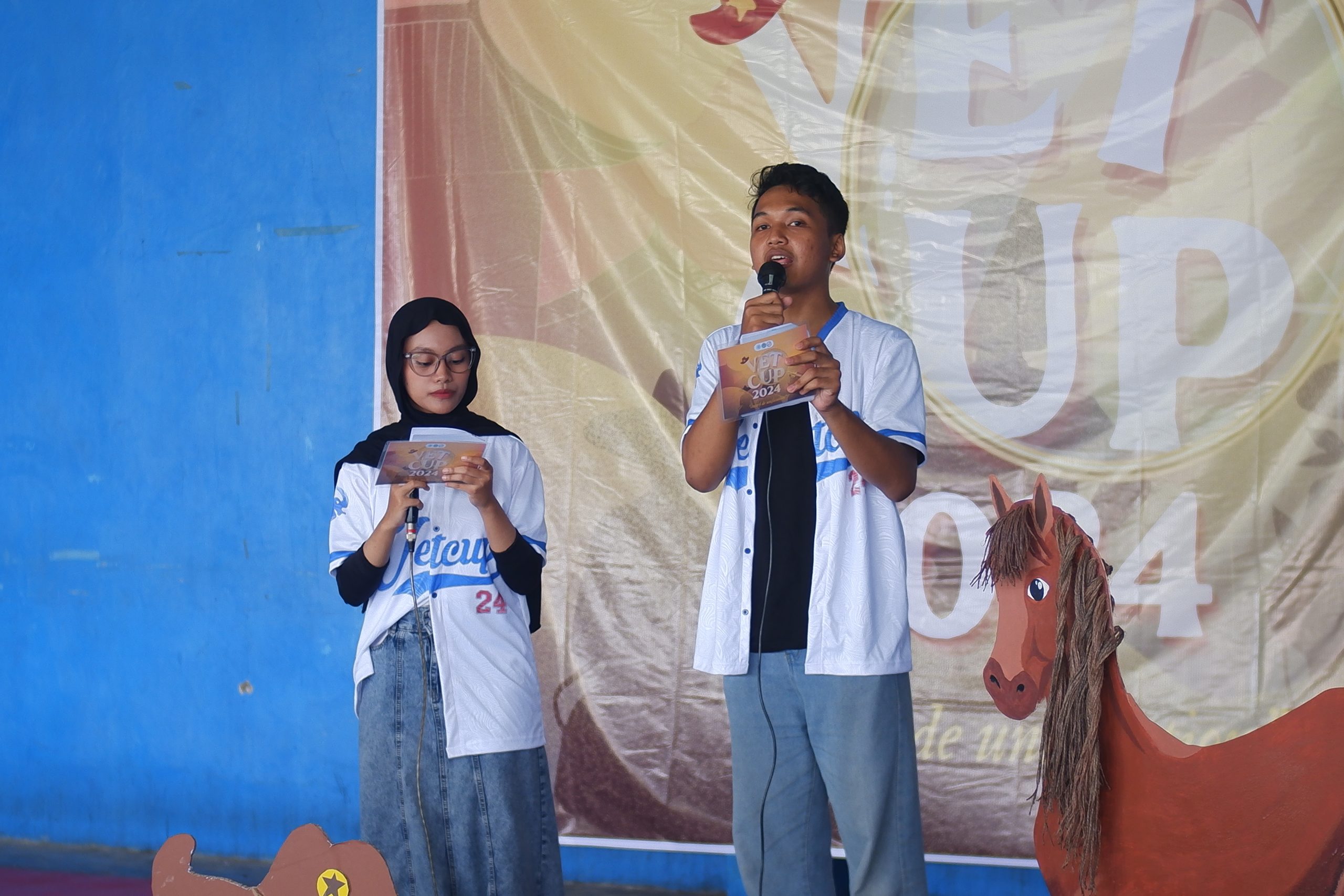
The futsal competition was held offline at the Yogyakarta Sport Academy over two days, on October 5-6, 2024. This event was attended by 8 teams from various universities in Indonesia competing for three winning titles. The e-sports MLBB competition was held online on October 12-13, 2024, with the semifinals and finals broadcast live on the Vetcup Instagram account on October 13, 2024. Six teams from various universities were attended in this competition. (SDG 17: Partnership for the Goals).
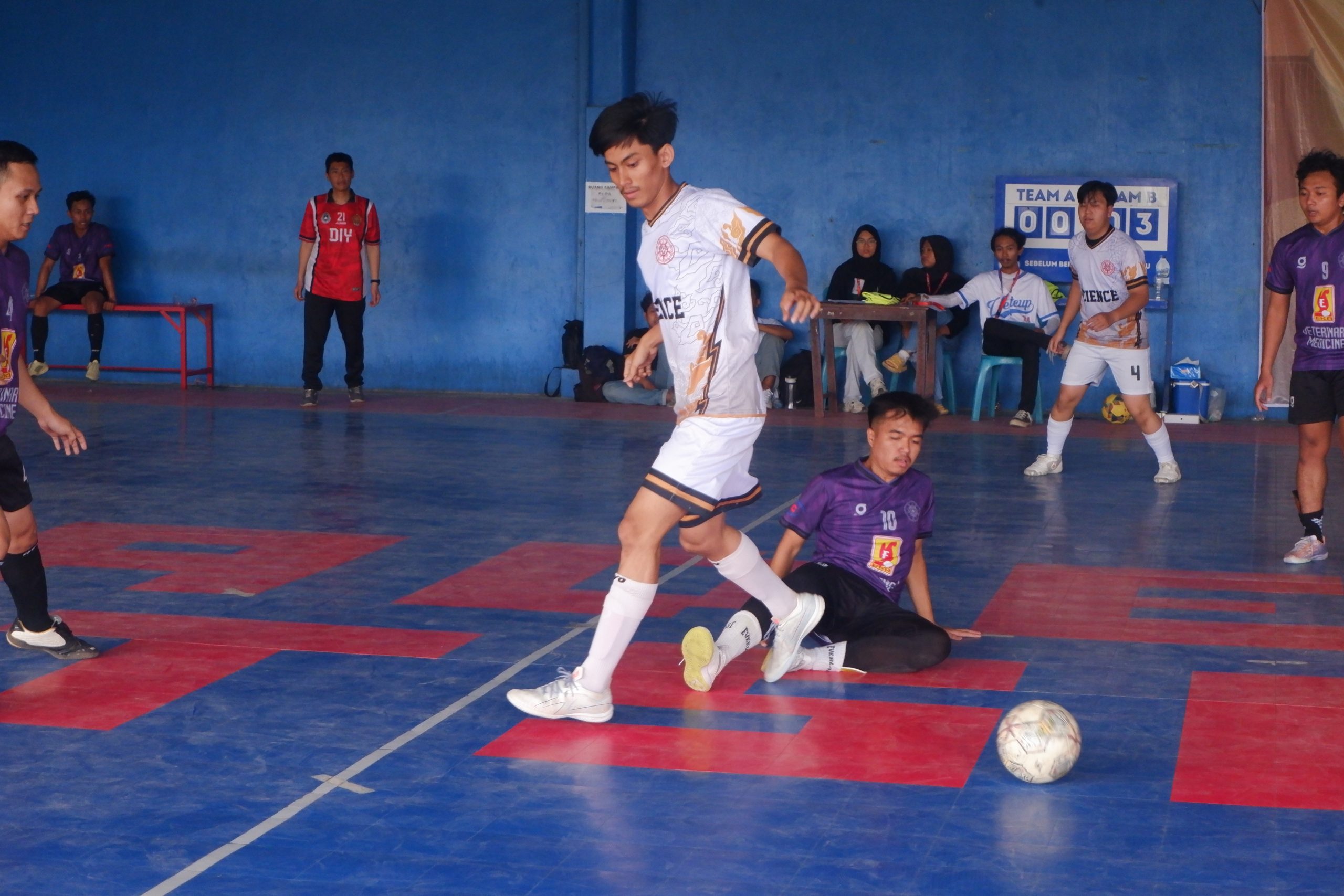
The solo vocal competition was held online from August 20 to October 12, 2024. Participants submit their videos using the link provided in the form. These videos will be uploaded on October 13, 2024, to the Vetcup YouTube account for judging. This year, the solo vocal competition is joined by 22 participants from different universities. The winners were announced via Vetcup Instagram account on October 18, 2024.
The Veterinary UGM Cup 2024 is indirectly aligned with the Sustainable Development Goals (SDGs), specifically SDG 3 (Good Health and Wellbeing) and SDG 16 (Peace, Justice, and Strong Institutions). Vetcup 2024’s influence and impact support the goal of promoting a healthy and prosperous life, as it contributes to improving students’ health through inter-university sports competitions. Vetcup also fosters peace, justice, and strong institutions by promoting fair and peaceful competition among participants from different universities in Indonesia.
Vetcup 2024 is expected to serve as a platform for students to develop non-academic interests and talents while honing their soft skills and hard skills. It is also hoped to foster a sense of unity and sportsmanship among students. This also supports SDG point 4, namely quality education.
Cr: Afifah Firyal Rifai

